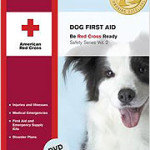April is Pet First Aid Awareness Month and the American Red Cross offers tips to the millions of pet owners as a way to keep their animals safe and healthy, especially as warm weather approaches.
Many Red Cross chapters across the country offer Pet First Aid courses. The Red Cross has also developed Dog First Aid and Cat First Aid Guides with DVDs to help you care for your pet. From basic responsibilities like spaying/neutering and giving medications, to performing CPR and preparing for disasters, these guides provide the information pet owners need to keep their pets healthy and safe. Contact your local chapter to see when classes are available. The guides are available through your local Red Cross chapter or you can visit the Red Cross Store.
The National Pet Owners Survey compiled by the American Pet Products Manufacturers Association points out that 39 percent of households in the United States own at least one dog and 33 percent own at least one cat. “Warmer weather can bring certain dangers for pets,” says Dr. Deborah Mandell, Pet Safety Advisor for the Red Cross. Mandell reminds pet owners to “Know what is normal for your pet – gum color, heart and pulse rate, body temperature, breathing rate – so you can recognize when something is wrong.”
One of the most common problems pets face in the warmer weather is heat stroke. This is because they are not yet acclimated to the warm temperatures. Some signs of heat stroke include heavy panting and being unable to calm down, even when lying down. The pet’s gum color may be brick red, their pulse rate may be fast, or they may not be able to get up. If someone suspects their pet has heat stroke, take the pet’s temperature rectally. If the temperature is above 105 degrees Fahrenheit, cool the animal down. The easiest way to do this is by using the water hose. Stop cooling the animal when the temperature reaches 103 degrees. Bring the pet to the veterinarian immediately as heat stroke can lead to severe organ dysfunction and damage.
Mandell says that the inside of a car can quickly reach 120 degrees during the warm weather months. Pet owners should not leave their furry friends in the car, even for short trips. This can quickly lead to heatstroke.
At this time of year, windows and doors in the home are more likely to be open. Pet owners should know that animals may try to get outside which increases the risk of trauma from jumping or falling from windows or being hit by vehicles. Some plants and flowers can be hazardous. For instance, many lilies are very poisonous to cats. Visit the ASPCA Poison Control web site to find out which plants and flowers are poisonous to animals. If someone thinks their animal is ill or may have ingested a poisonous substance, they should contact their veterinarian.
Pet owners can follow these important steps to help keep their pet healthy:
- Give pets plenty of exercise
- Make sure pets have plenty of fresh, cool water
- Make sure pets get regular yearly checkups with their veterinarian, and are up to date on vaccines, especially rabies
- Get pets spayed or neutered
- Keep dogs on leashes outside – another animal may be too much temptation
- Know how to perform CPR and provide basic first aid until veterinary care is available
Don’t forget to include pets in emergency plans as well:
- Plan to take pets along if ordered to evacuate.
- Most Red Cross shelters cannot accept pets because of health and safety concerns and other considerations. Know which friends, relatives, hotels, boarding facilities accept pets in an emergency.
- Assemble a portable kit with emergency supplies for pets:
- Leashes, harnesses and/or carriers
- Food, drinking water, bowls, manual can opener
- Medications and copies of medical records
- Current photos of the pets
The Red Cross hopes pets and their owners have a great spring and summer and points out that Pet First Aid Awareness Month is a perfect time to learn how to protect the family pet from hazards. Additional tips on how to keep pets in good health are located on the Red Cross Pets and Disaster Safety Checklist.
About the American Red Cross:
The American Red Cross shelters, feeds and provides emotional support to victims of disasters; supplies nearly half of the nation’s blood; teaches lifesaving skills; provides international humanitarian aid; and supports military members and their families. The Red Cross is a charitable organization — not a government agency — and depends on volunteers and the generosity of the American public to perform its mission. For more information, please visit www.redcross.org or join our blog at http://blog.redcross.org.
Bart
Latest posts by Bart (see all)
- Farewell, Beloved Bart - November 26, 2018
- Goodbye Flies – Subtle Fly Traps that Get the Job Done - August 17, 2018
- Vita Bone® Artisan Inspired® Dog Treat Challenge - July 19, 2018
